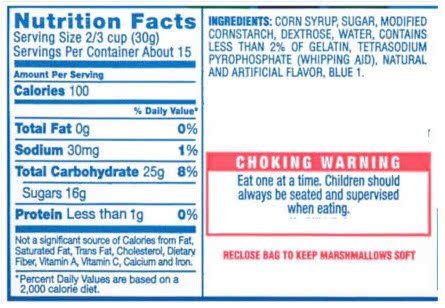Soft, puffy marshmallows are heavenly clouds of delight, even more delicious when gooey with hot chocolate or caramelised over a campfire. And of course your pooch won’t want to be left out when they see you indulging so happily, but can dogs eat marshmallow?

Is it safe for them? Let’s dive in, balancing the sweetness with some much-needed reality to keep your dog happy and healthy.
Before introducing any new foods to your dog’s diet, always consult your vet. Individual dogs may have different intolerances, dietary needs, and health considerations. This article is not a substitute for professional veterinary advice.
Are Marshmallows Bad for Dogs – The Sugary Truth
Marshmallows might seem like a fairly innocent treat to share with your pup, however, their sugar-packed nature is where the problem lies. A dog’s system isn’t meant to handle the same levels of sugar that we humans can. Regular consumption of sugary foods like marshmallows can lead to an unbalanced diet, weight issues and dental problems in our dogs. Plus, the artificial sweeteners often found in sugar-free versions are a big no-no for your dog’s health. So regular marshmallows is definitely not something to add to their menu.
Xylitol in Marshmallows – Sugar Free Danger
Xylitol, while a boon for human dieters, spells danger for your dog. This artificial sweetener, increasingly common in sugar free products, can cause a rapid and dangerous drop in blood sugar levels in your pooch, leading to symptoms like lethargy, uncoordination, and even seizures. The seriousness of xylitol consumption in dogs cannot be overstated even in a small amount – it’s a fast-acting toxin that requires immediate veterinary attention. Always be vigilant about checking food labels, especially when your pup’s big, pleading eyes are looking up at you for a tidbit.
Be Sure to Check the Ingredients Carefully
Even if there is no toxic xylitol present to make them sick, the majority of the ingredients in marshmallow is one form or another of sugars and additives – sugar, corn syrup, artificial sweeteners, cornstarch, oh and colourings and preservatives. One red flag after another for dogs.

Will Eating Marshmallows Make a Dog Sick?
So, what happens if your dog does manage to snag a marshmallow? In most cases, a single marshmallow won’t cause a trip to the vet, providing your dog is not allergic to any of the ingredients or has other contributing issues. But they still aren’t good for dogs, so it’s not going to do them any favors either. The high sugar levels can upset their digestive system, leading to discomfort and potentially an upset stomach. Think of it like feeding a child too much candy – not dangerous in the short term, but definitely not recommended.
Continued over the long term, eating marshmallows can lead to serious conditions such as:
- Dental Problems – sugary treats like marshmallows can contribute to tooth decay and gum disease in dogs, leading to chronic dental issues
- Obesity – sugar in marshmallows can cause weight gain, leading to obesity, a condition that can severely impact the quality of life and overall health.
- Diabetes – eating sugar regularly increases the risk of developing diabetes, a serious condition that requires lifelong management
- Digestive Issues– frequent consumption of marshmallows can disrupt the delicate balance of a dog’s digestive system, leading to problems like chronic upset stomach and irregular bowel movements
- Pancreatitis – the high fat and sugar content in marshmallows can contribute to the development of pancreatitis, an inflammation of the pancreas that can be painful and debilitating for dogs
- Nutritional Deficiencies – feeding marshmallows regularly can lead to nutritional imbalances, as these treats take the place of more nutritious food options in the diet
- Behavioral Issues – just like in humans, a diet high in sugar can lead to hyperactivity and erratic behavior in dogs, which can be challenging to manage
Do Marshmallows Have Any Nutritional Value?
The short answer is no. Marshmallows are mostly just sugar, corn syrup, and gelatin – a combination that offers zero nutritional benefits for your dog, and there are no reasons to let your dog eat them. Feeding your pet marshmallows is like filling their tank with dirty fuel; it might not cause an immediate breakdown, but it’s certainly not helping their engine run smoothly.

Can Dogs Eat Fluff?
Marshmallow fluff, much like its solid counterpart, is high in sugar, corn syrup and the other unwanted ingredients, and lacks any nutritional value for your dog. Its sticky, gooey texture could also be a choking hazard, especially for smaller dogs. It’s best to avoid sharing this sweet treat with your dog and opt for healthier alternatives instead.
Are Any Marshmallows Safe for Dogs?
The only truly safe ‘marshmallows’ for your pet are those that are specifically made for dogs. These canine-friendly treats are designed to be both delicious and nutritious, ensuring that your dog can enjoy a sweet snack without any of the associated risks. Stick to these, and you’ll keep your pup’s tail wagging safely.
Tasty And Safe Alternative Treats
We all love to spoil our pets, but it’s important to do so wisely. Instead of letting them eat sugary human marshmallows, consider healthier food alternatives that cater to your dog’s taste and dietary needs. There are plenty of specially formulated doggy snacks, using dog-safe ingredients to create sweet but healthy options that mimic the sweetness dogs might crave.
There are also nature’s own sweets that dogs can enjoy in moderation, for example:
- apples
- bananas
- pineapples
Instead of allowing dogs to eat marshmallows, these treats will satisfy their sweet tooth and also contribute positively to their overall health. Packed with beneficial nutrients and free from harmful additives they’re sure to keep pooch in appreciative waggy tails. But even these should only be given in moderation and occasionally, and not instead of a well balanced diet with specially created dog food, for the age, weight, breed and health of your dog.
Final Thoughts… Can Dogs Eat Marshmallows?
So, can dogs eat marshmallows? It should be very clear by now that although marshmallows may be tempting, they are mostly a troublesome choice for doggy nutrition. Giving your dog marshmallows is a big no-no. While they might not cause immediate harm, their high sugar content and the risk of toxic ingredients like xylitol make them an unsuitable snack for our four-legged pals. As responsible pet parents, it’s up to us to make smart, safe choices when it comes to our dogs’ diets. Opting for dog-specific snacks, especially those designed to satisfy their sweet cravings in a healthy way instead of feeding dogs marshmallows is the best way to show our love without compromising their health. Remember, a happy dog is a healthy dog, and keeping their snacks safe is a big part of that equation.
FAQs
Is It an Emergency If a Dog Ate One Marshmallow?
If your dog eats just one regular marshmallow, don’t panic. Keep an eye on them for any signs of gastrointestinal distress and make sure they have plenty of water. However, if the marshmallow contained xylitol or other harmful substances, or if your dog has existing issues or starts showing signs of distress, act quickly and contact the vet.
Can Marshmallows Kill Dogs?
While one standard marshmallow is unlikely to be fatal, the danger lies in marshmallows containing xylitol. This artificial sweetener can be life-threatening even if your dog eats relatively small amounts. It’s a sobering reminder that what’s harmless for humans can be hazardous for our furry friends. Always keep xylitol-containing products well out of paw’s reach.
Can Dogs Eat Mini Marshmallows?
The same rules apply for mini marshmallows as for regular ones. These marshmallows still contain high levels of sugar, corn syrup and potentially harmful ingredients like xylitol. Plus, their small size can be deceiving, making it easy for dogs to eat too many too quickly, increasing the risk of gastrointestinal upset or choking, particularly in smaller breeds. So avoid giving your dog any mini marshmallow too.





